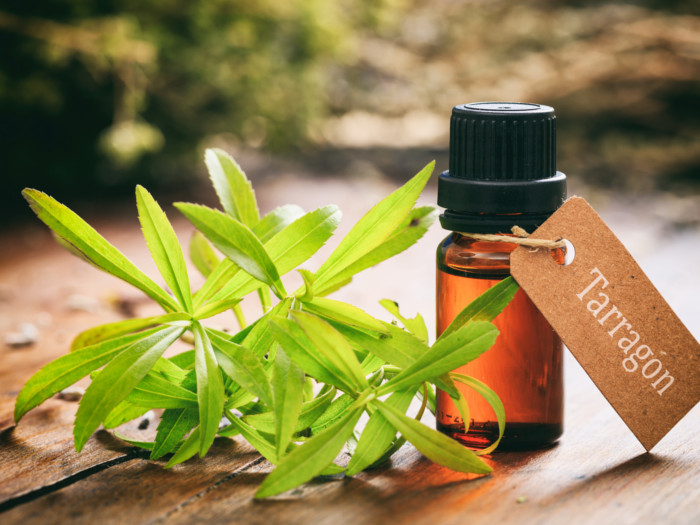This herb has helped define the flavor of French cuisine but provides a wide variety of health benefits at the same time.
What is Tarragon?
The versatile and easy-to-grow tarragon herb is considered one of the four essential herbs in French cooking. It is bittersweet, with notes of anise, and is used primarily in savory dishes, particularly with chicken, fish, or eggs. Tarragon vinegar is a popular application, and it is also occasionally found in pickling spice.
Nutrition
In 1 tablespoon of ground tarragon, there are 14 calories, with approximately 1 gram of protein, and 2 grams of carbs. It is also an excellent source of magnesium, zinc, calcium, and iron. [1]

Tarragon essential oil comes from the leaves of a herb in the Asteraceae family. Photo Credit: Shutterstock
Serving Size : Nutrient Value Water [g] 7.74 Energy 295 Energy [kJ] 1236 Protein [g] 22.77 Total lipid (fat) [g] 7.24 Ash [g] 12.03 Carbohydrate, by difference [g] 50.22 Fiber, total dietary [g] 7.4 Calcium, Ca [mg] 1139 Iron, Fe [mg] 32.3 Magnesium, Mg [mg] 347 Phosphorus, P [mg] 313 Potassium, K [mg] 3020 Sodium, Na [mg] 62 Zinc, Zn [mg] 3.9 Copper, Cu [mg] 0.68 Manganese, Mn [mg] 7.97 Selenium, Se [µg] 4.4 Vitamin C, total ascorbic acid [mg] 50 Thiamin [mg] 0.25 Riboflavin [mg] 1.34 Niacin [mg] 8.95 Vitamin B-6 [mg] 2.41 Folate, total [µg] 274 Folate, food [µg] 274 Folate, DFE [µg] 274 Vitamin A, RAE [µg] 210 Vitamin A, IU [IU] 4200 Fatty acids, total saturated [g] 1.88 10:0 [g] 0.03 12:0 [g] 0.01 14:0 [g] 0.12 16:0 [g] 1.2 18:0 [g] 0.41 Fatty acids, total monounsaturated [g] 0.47 16:1 [g] 0.11 18:1 [g] 0.36 Fatty acids, total polyunsaturated [g] 3.7 18:2 [g] 0.74 18:3 [g] 2.96 Phytosterols [mg] 81 Sources include : USDA [2]
Benefits
The benefits of tarragon include the following:
- Historically, the tarragon plant has been used for pain relief, particularly oral pain, thanks to the presence of eugenol, a numbing agent, in tarragon leaves.
- Tarragon tea also calms nerves and is commonly used by insomniacs to induce sleep. [3]
- When this herb is used as an aperitif, it can increase appetite, and stimulate the production of saliva and gastric juices.
- It is also a natural diuretic that will relieve water retention in the body.
- Due to the carotenoids in tarragon, phytonutrients that help fight free radicals, this herb is particularly good for digestive problems and intestinal function. [4] [5]
- Parts of this plant are also used to promote reproductive health in females by inducing and regulating menstruation.
- Its high dose of potassium promotes cardiovascular health.
Uses
Let us take a look at its many uses.
- It can be used in both dried and fresh forms.
- It is particularly popular as a herb for chicken, fish, and egg dishes.
- To get the best medicinal dose, many people make a tea by steeping its leaves.
- This herb can also be used topically as an oil.
- It is a natural preservative, thanks to its antibacterial quality. [6]
- The oil derived from this herb is popular as a deodorizer.
- It is also used to make tarragon vinegar, which is flavored with leaves soaked in the vinegar.
How to Store?
Let us take a look at how to store this herb.
- Step 1: If you grow your own fresh herbs, the best time to harvest is when your plant is between 1 and 2 feet tall.
- Step 2: Pluck or cut the leaves, being careful not to damage or bruise them.
- Step 3: Wash them and pat them dry, then store the leaves between damp paper towels or in a plastic Ziploc bag in the refrigerator for up to 2-3 weeks.
Note: If you are drying your herb, dry the leaves for 2-4 hours on low heat in the oven until they crumble on touch.
Side Effects: Women who are pregnant or breastfeeding should avoid using this herb, as it may promote bleeding and could complicate the outcome of the pregnancy. If you have an allergy to plants in the ragweed family, you may experience a cross-reaction, and should, therefore, speak to your doctor before adding this to your health regimen.
